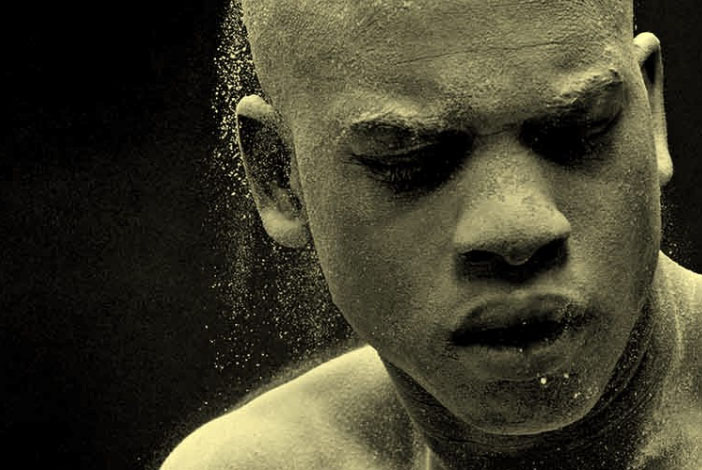
The Island was written in 1973 during the apartheid regime in South Africa. It was devised and rehearsed in secret and first performed in Cape Town in front of a racially mixed audience, which was illegal at that time. From our viewpoint, some years on, we might see the events of that era in an historical context; since then we have witnessed the fall of the apartheid regime, the release of Nelson Mandela and his elevation to president. Although it still struggles with the legacy of white rule and innumerable economic and social problems we might now regard South Africa as a success story; other countries have taken its place in the news headlines. But we can still learn something from this simple story of two men thrown together in a stark prison cell and forced to endure harsh conditions.
John and Winston are serving long prison sentences at an island jail. They exist under a harsh regime, beaten and bullied by an unseen guard. We see them first working on a beach, shovelling uncountable loads of sand from one place to another in seemingly never-ending and pointless toil. Grunting and with rasping breath they occasionally eyeball each other, their sweat drips and their muscles strain; you get the feeling they are being watched. The horn sounds, they are shackled, battered and returned to their cell. At last we see them as human beings, they chat and joke, supporting each other and sharing stories. John, played by Mark Springer, is eagerly rehearsing a play for the prisoners but Winston (Edward Dede) must take the female part and is not so keen.
The Island is played in the round on a sparse stage set with plain lighting; we feel like voyeurs looking down into the cell. The two actors have nothing to hide behind and thanks to strong performances by both we get a real sense of the relationship between the two prisoners. They are friends, but maybe they have to be because there is no other way? Mark Springer is solid and compassionate as John, who seems the stronger character, brasher and more amiable. Then gradually more of Winston’s temperament emerges. Edward Dede skilfully reveals the change of mood in Winston as he hears of his cell-mate’s good fortune; at first surprised and happy, then later brooding, almost bitter: “your freedom stinks John and it’s driving me mad”. What is harder to perceive from this performance is the context of the play, perhaps lost to us with the passing of time. But in a sense that doesn’t matter. There are still prisons with prisoners who are in them because of conscious political acts against laws that are unjust. History repeats itself and theatre continues to have a function of comment and reflection. The Island remains relevant because it is a story of faith and connection in individuals imprisoned by an oppressive state regime. ★★★☆☆ Adrian Mantle 24th May 2017

